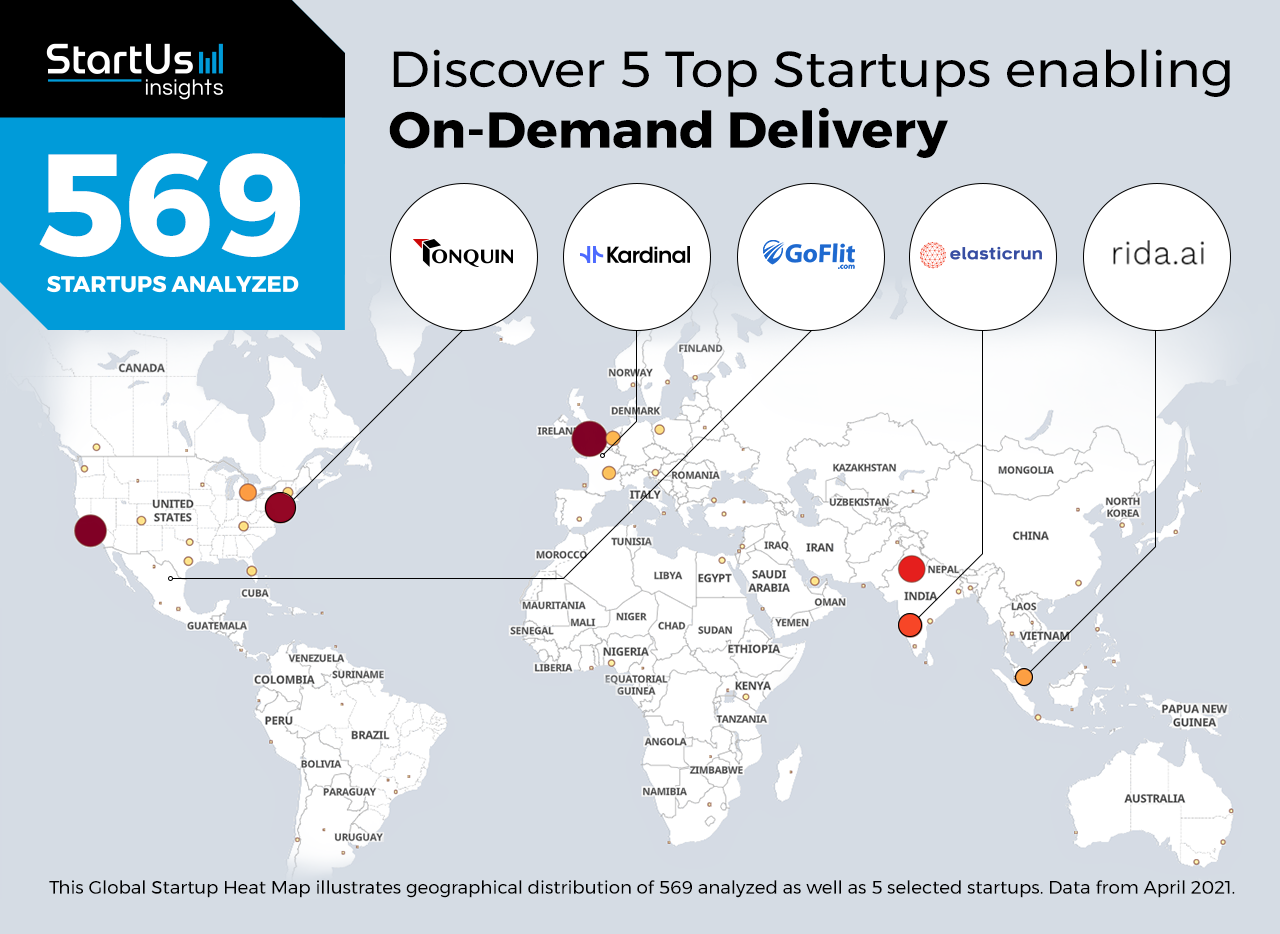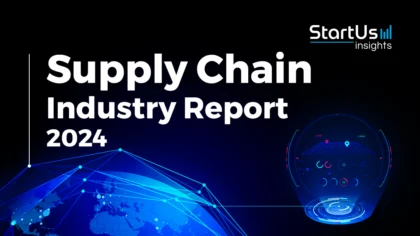Staying ahead of the technology curve means strengthening your competitive advantage. That is why we give you data-driven innovation insights into the logistics industry. This time, you get to discover 5 hand-picked on-demand delivery startups.
Global Startup Heat Map highlights 5 Top On-Demand Delivery Startups out of 569
The insights of this data-driven analysis are derived from the Big Data & Artificial Intelligence-powered StartUs Insights Discovery Platform, covering 1.379.000+ startups & scaleups globally. The platform gives you an exhaustive overview of emerging technologies & relevant startups within a specific field in just a few clicks.
The Global Startup Heat Map below reveals the distribution of the 569 exemplary startups & scaleups we analyzed for this research. Further, it highlights 5 on-demand delivery startups that we hand-picked based on criteria such as founding year, location, funding raised, and more. You get to explore the solutions of these 5 startups & scaleups in this report. For insights on the other 564 on-demand delivery solutions for logistics, get in touch.
GoFlit provides On-Demand Fleet Services
The increase in online shopping and growing consumer demand for faster last-mile delivery spur the development of on-demand shipping services. Frequently, these services operate within business-to-business (B2B) models, connecting product distributors and fleet managers. Startups develop on-demand B2B fleet solutions to help businesses increase their distribution capacities.
Mexican startup GoFlit provides on-demand fleet services to companies within industries such as cold chain, pharmaceuticals, textile, and electronics. The startup’s platform matches businesses with the shipment units of appropriate sizes, located closest to the warehouse, for urgent collection and delivery. Additionally, the platform handles unit and operator verification, GPS tracking, and sends real-time alerts, thereby optimizing the efficiency of on-demand logistical services.
Tonquin offers On-Demand Auto Parts Delivery
Auto part stores, dealerships, and car repair services face spare part shortages daily because of the financial toll associated with maintaining a large inventory. To mitigate such shortages, automotive companies often employ a private fleet of drivers. However, this increases operational costs and requires the development of route optimization schemes. Therefore, startups develop on-demand shipment platforms for auto parts delivery.
US-based startup Tonquin provides on-demand auto part delivery services to spare part stores and dealerships. The startup connects businesses to a network of local on-demand drivers, which optimizes delivery schedules. Tonquin’s platform further enables real-time delivery tracking, shuttle route scheduling, and supply chain analytics to provide comprehensive delivery insights within the automotive industry.
ElasticRun extends Shipping to Low-Density Regions
Small business owners and operators in rural areas travel long distances to replenish their stocks. This forces them to either hire dedicated drivers or drive by themselves, thereby reducing stores’ operational time. By aggregating small businesses in remote areas, startups provide local owners with access to idle delivery transport and further expand the networks for product distributors.
Indian startup ElasticRun develops an asset-light logistics network that extends the reach of on-demand shipment to low-density areas. The startup’s platform allows local small business owners to optimize inventory management through on-demand shipments. Additionally, ElasticRun provides product distributors with access to previously underserved locations.
Kardinal advances Real-Time Route Optimization
Route planning for traditional shipment requires prior information on the number of orders and delivery addresses. On-demand shipment, however, deals with orders as they are placed, instantaneously and requiring immediate actions. Moreover, inefficient route planning for on-demand orders increases delivery time, which then increases the waiting time for consumers. To mitigate this, startups develop route optimization solutions that increase delivery drivers’ efficiency.
French startup Kardinal develops real-time optimization solutions for parcel and fresh produce delivery, as well as for bulk transport. The solution leverages AI to adapt to unplanned events such as traffic jams and emergency orders. The startup’s route optimization helps businesses improve overall performance and increase customer satisfaction. By implementing real-time route adjustments, Kardinal helps businesses adapt to the on-demand economy.
RIDA aggregates Third Party Logistics (3PL) Providers
Since 3PL providers vary in their prices, business owners struggle to find a service that fits their budget. Moreover, during peak hours, finding available service involves considerable time and effort. To this avail, startups develop 3PL comparison solutions that allow business operators to compare several services’ availability and prices within a single environment.
RIDA is a Singaporean startup that develops a 3PL aggregation platform for businesses in the food industry, as well as textiles, cold chains, and floriculture. The solution consists of an aggregation app and the application programming interface (API) integration service. The platform allows users to compare prices of different 3PL providers, check their availability, and distribute on-demand shipment assignments between several providers depending on their capacity.
Discover more Logistics startups
The 569 on-demand delivery startups, such as the 5 examples highlighted in this report, focus on route planning and optimization, remote region accessibility to shipping, as well as on-demand fleet services. While all of these technologies play a major role in advancing the logistics sector, they only represent the tip of the iceberg. To explore more logistics technologies, simply get in touch to let us look into your areas of interest. For a more general overview, you can download our free Logistics Innovation Report to save your time and improve strategic decision-making.






